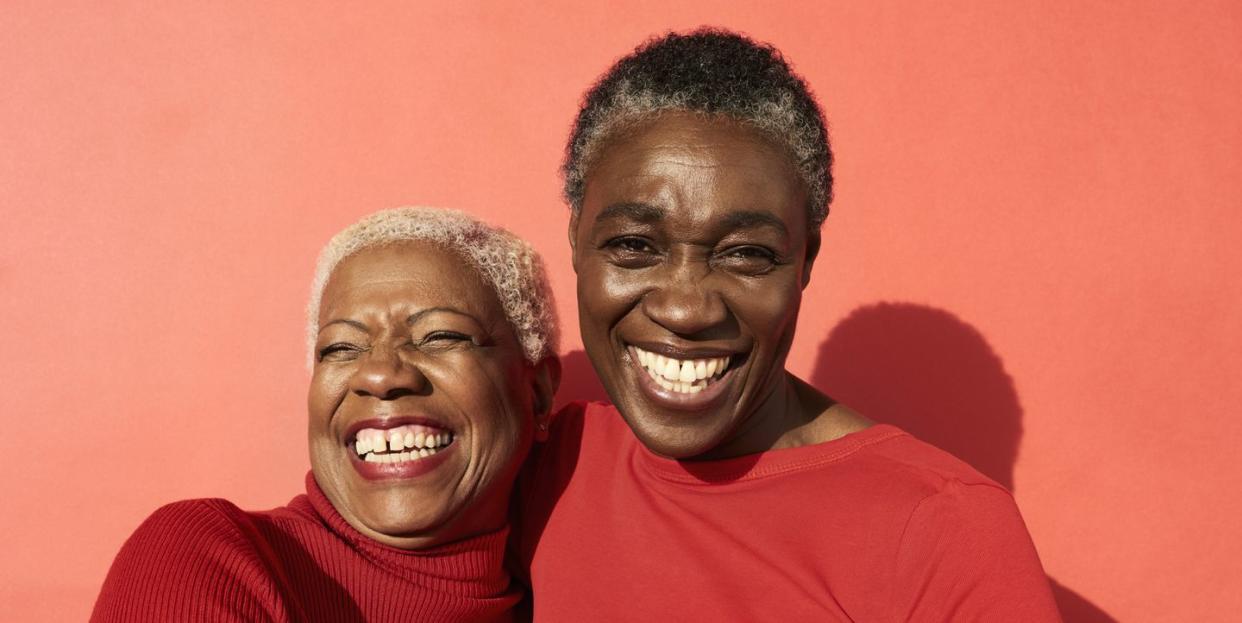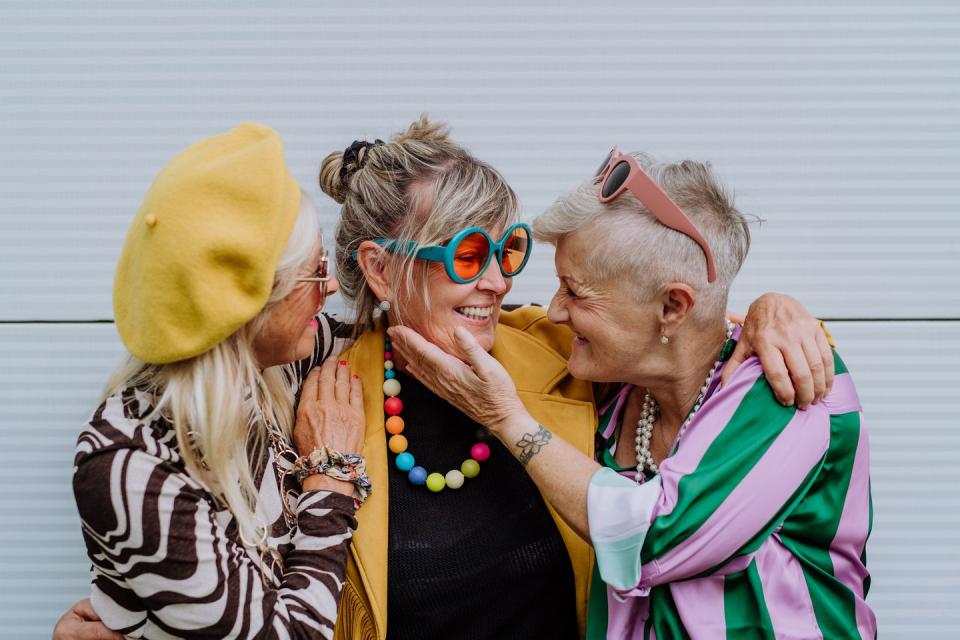This geriatrician's 5 key tips for ageing well are refreshingly straightforward

Just before joining Women's Health for this interview, Dr Lucy Pollock had to tell two women that one of her patients would likely die soon. The patient, an elderly man, is husband to one of the pair; brother to the other. Despite having recently broken news of the man's fate to those who love him the most, she seemed calm.
'Most deaths, certainly of my frail, older patients are very peaceful,' she explained. 'I told the family that I think, even with the treatment they're giving him, he's going to close his eyes and slide away. And they said, "That would be lovely".'
This reframing of dying – and, more broadly, ageing – is Dr Pollock's main goal. A geriatrician with three decades of experience working with the elderly, she's realised that the way so many people see and think about older folk (weak, dependent, helpless) is far from accurate. After all, isn't getting old a goal far better than the alternative?
'We should be able to embrace the idea of a long life with optimism, and at the same time, be realistic about the fact that there are some difficult things that can happen within the last 20-or-so years. But we can have some control over this period, and we can have more agency over our future, and we should make the most of the longevity dividend that we are lucky enough to have now,' she says.
Her new book, The Golden Rule (Penguin Michael Joseph, published 4 July) dives into this topic. The name refers to the infamous Golden Rule in the Christian faith - do unto others as you would have them do unto you - which she found scribbled on a piece of paper at her mum's house.
'I'm a big rule breaker. I don't really like rules. But I think seeing that from my mum chimed with me as a doctor. It doesn't mean that I do to my patients exactly what I would have done to me in terms of medical treatment. But what I do is treat people with the same respect I would want.
'We all have different ideas, goals and wishes, and we need to frame medical treatment around what's important to individuals. I find out what matters to my patients and respect their values and wishes.'
How to age well
In an age of expensive supplements and pricey treatments geared towards longevity, Dr Pollock is less interested in sharing tips staying healthy as you age than you might imagine. Her advice, rather, is reassuringly straightforward.
'I would say they should be doing five sensible things: don't smoke, don't drink to excess, take some physical exercise, eat your greens and maintain an interest in things outside of your job,' she says.

Indeed, for Dr Pollock, ageing 'well' doesn't necessarily mean staying young despite the clock turning. And it doesn't mean judging the value of an older life compared to a young persons: 'If you're in your 20s, you might look at somebody in their 90s and think, 'Living alone in a one bedroom flat, not going outside and watching television all day, isn't much of a life.' But if you ask the 90-year-old lady how she is, she may well say 'I love my life, thank you very much'.'
Instead, she believes ageing well means simply means being okay with getting older.
'We have new knowledge to show that your attitude affects your age. It's now been shown that people who have a positive attitude to ageing actually age better physically - so how you think changes how your body behaves,' she says.
'And it's not that they're comparing healthy people who are positive to disabled people who've got multiple illnesses and feel negative. Really, there are people who are quite frail, with multiple medical problems, yet are positive about their future and they will do better than somebody who may actually be quite physically well, but has a negative attitude.'
Positive ageing
Changing your mindset around old age is an inside and outside job.
'It's partly personal: stopping and looking around and instead of worrying about wrinkles, instead believing that every line on your face is an experience. It's recognising that, when you've lived a long life, it won't be perfect but you have gained skills and experiences,' says Dr Pollock.
'And, alongside individual attitudes to getting older, is the attitude of our society. We know that people who live in a society that has a positive attitude to older people do better in later life. And respect for old people can mean allowing people to work later in life if they want to, which might mean retiring from their main job and doing something charitable, fun or interesting.'

There are other ways of encouraging older people into the community too. According to the Institute of Ageing, Japan – which has the largest population of elderly people in the world – has shopping centres that cater specifically to ageing populations, with numbers on price tags displayed in large size to make reading easier and staff who are accustomed to serving elderly people with care and respect.
These things keep people active in the community and remind them they still have value.
Of course, staying positive is also harder when your body is struggling. 'If your health is hit, don't become despondent. Know that, quite often, people are told that situation is much worse than it is. For example, people who have a stroke are often absolutely terrified that they're going to have another one. When you come into hospital all the focus is on reducing risk, quite rightly, but it makes you feel as its inevitable – and it's not,' reminds Dr Pollock.
Maintaining agency with age
In the West, growing older can leave you feeling at the mercy of others, particularly doctors. 'Many of them are hard pressed with time, so if you go to them with a problem, they will try to fix it as quickly as possible. But you have agency over how your condition is treated too,' Dr Pollock reminds.
She advises using the BRAN theory when making decisions about medications and medical advice:
Benefit: What are the benefits of taking this step in my healthcare?
Risk: What is the risk of trying this?
Alternatives: What are the alternative health treatments you could try?
No treatment: What would happen if you didn't treat this condition?
In some situations in later life, not treating a problem – or treating it with lifestyle interventions rather than medical support – can actually improve their life. Dr Pollock gives the example of an overactive bladder.
'A lot of older people find that they need to dash for the loo and they're given tablets that can calm that down, but they only work for one in nine people. That means eight out of nine people take them without actually getting any benefit and significant side effects such as dry eyes, dry mouth and not being that good for the brain,' she says.
'By using BRAN, you could notice that the side effects are worse than the problem.' In this case, perhaps it would be best to try an alternative method of removing caffeine - which can be a urinary stimulant – and just coming to terms with the original problem.
What advice would you give your 80 year old self?
This question changed Dr Pollock's outlook on life. 'We often hear about people giving advice to their 18-year-old self, but I thought it would be more interesting to look forward.
But I realised it's very difficult to project yourself into your future, so when we start giving advice to our 80-year-old selves, we tend to be issuing advice that we think we should be taking right now in order to be happy when we're older,' she says.
In the book, people tell her the advice they'd give would range from, 'Try not to worry' to, 'Be curious'.
But Dr Pollock tells me that, right now, her advice for her 80-year-old self would be: 'Have a blast. Keep good friends. Be nice to people.'
You Might Also Like


